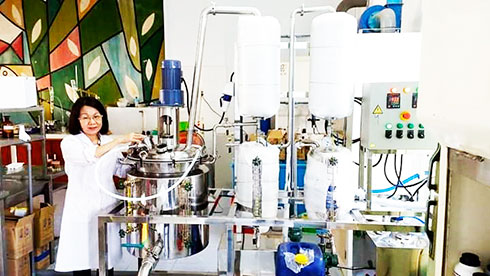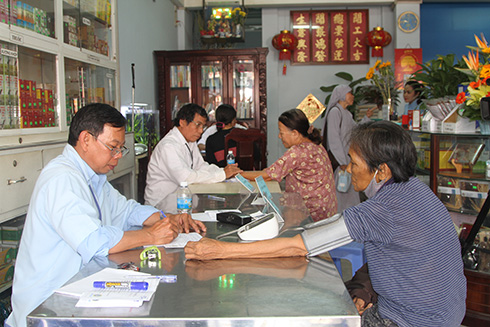
The research on extraction procedures and production equipment model for producing lutein and its products from Tagetes erecta has just been approved and highly appreciated by Khanh Hoa Council of Science and Technology...
The research on extraction procedures and production equipment model for producing lutein and its products from Tagetes erecta has just been approved and highly appreciated by Khanh Hoa Council of Science and Technology. The result of the study is considered as a scientific base for commercializing the production of lutein used as a food coloring agent from Tagetes erecta.
PhD. Hoang Thi Hue An, Nha Trang University says synthetic coloring is used in food to make it look more appetizing. Cheap with a wide range of colors, synthetic coloring is, however, suspected of triggering some health risks. Therefore, making safer and natural coloring alternatives has drawn attempts of scientists worldwide.
Lutein, a carotenoid, is a natural yellow food coloring certified to be safe for use in food by the U.S Food and Drug Administration (FDA). It is also used as a nutrient supplement to reduce heart disease risks, enhance immune functions, etc. Therefore, the extraction and purification of lutein from natural ingredients to be used in food, cosmetics and pharmaceutical industries has drawn the attention of businesses worldwide.

|
The Tagetes erecta is rich in lutein. Vietnam, a tropical country, is suitable for developing Tagetes erecta plantations for lutein production. However, at present, Vietnamese businesses still have to import lutein in the form of raw materials and finished products with a high price. Few lutein-related studies have been conducted at home so far. Previously, PhD. Hoang Thi Hue An and her colleagues had successfully developed the process of extracting lutein in the laboratory from Tagetes erecta. However, the cost of finished products are relatively high due to the high expense of improved lutein extraction process, low lutein production efficiency in the purification stage and much manpower required (for lack of specialized equipment).
PhD. Hoang Thi Hue An says the new things of this research include the improvement in conditions for processing the flowers with high economic efficiency and minimized environmental pollution; energy efficiency methods in flower drying; and refining method to create safe lutein products. From 2016 to 2018, the research group continued to be assigned by Khanh Hoa Department of Science & Technology to undertake further study on Tagetes erecta extracting procedures and a lutein producing equipment model. They used Tagetes erecta planted in Dien Phuoc Commune, Dien Khanh District to extract lutein. After 2 years, the research group has introduced 2 technological procedures for extracting lutein from fresh and dry flowers with high economic value and quality. Lutein collected is an organic solvent used as a food coloring agent and nutrient supplement (food additive) which helps ameliorate eye sight and fights against oxidation.
Moreover, the researchers have also successfully made a drawing for the trial production of lutein from Tagetes erecta with a capacity of 20kg of raw material/ batch. Particularly, the residue of organic solvents and heavy metals are below the permitted level, meeting food hygiene and safety requirements; and the product is stable when stored at -20 degree centigrades for 30 days (in the dark). Its cost is similar to that of the imported. It can be used as a food coloring agent and nutrient supplement.
The research drawing clearly identifies the parts and design models as required. They can be used as the basis for the design and manufacturing on an industrial scale. The result of the research is the scientific basis for production and commercialization, contributing to the foundation of industrial establishments producing lutein from Tagetes erecta, according to Associate Professor, PhD. Bui Quang Thuat, Vice-Director of Food Industries Research Institute, Hanoi.
Huynh Ky Hanh, Director of Department of Science & Technology appraised the initial results of the research, adding that the research team should consider seeking a business partner to continue the research and production on a commercial scale.
Khanh Ha.
Translated by N.T








